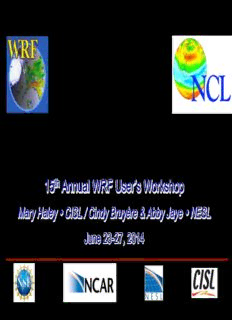
Post-processing WRF-ARW data using NCL PDF
Preview Post-processing WRF-ARW data using NCL
Post-processing WRF-ARW data using NCL 15th Annual WRF User’s Workshop Mary Haley CISL / Cindy Bruyère & Abby Jaye NESL June 23-27, 2014 The National Center for Atmospheric Research is sponsored by the National Science Foundation. Four main goals 1. Introduce you to NCL and WRF-NCL 2. Get you familiar with WRF-NCL scripts • Opening and examining a WRF output data file • Reading and querying variables • Plotting variables 3. Sneak in tips and information for existing users 4. Tell you what’s new in V6.2.0 and future plans NCL & WRF-NCL WRF User’s Workshop June 23-27, 2014 l l Topics • Overview • NCL language basics • File input/output • Data Analysis • Visualization • Calling Fortran code from NCL • Tips, where to get help • What’s new NCL & WRF-NCL WRF User’s Workshop June 23-27, 2014 l l A scripting language developed at NCAR and tailored for the analysis and visualization of geoscientific data http://www.ncl.ucar.edu/ NCL • Developed in NCAR/CISL in close collaboration with CGD & MMM staff • Open source, binaries and source available • Extensive NCL website, hundreds of examples • Hands-on workshops • Well-supported NCL & WRF-NCL WRF User’s Workshop June 23-27, 2014 l l What is NCL? • A scripting language similar to Matlab, Python, IDL • Tailored to climate and weather sciences • Has variable types, “if-then-end if”, “do” loops, arithmetic operators • F90-like array arithmetic that automatically ignores missing values (where it makes sense) • Can call your own Fortran 77/90 or C routines 1. Simple, robust file input/output 2. Hundreds of data analysis routines 3. Publication-quality graphics that are highly customizable NCL & WRF-NCL WRF User’s Workshop June 23-27, 2014 l l NCL: File input and output • Data model based on netCDF model (metadata describes data) • One function reads all supported data formats: − NetCDF3, GRIB 1 and 2, HDF4, HDF5, HDF-EOS2, HDF-EOS5, shapefiles, NetCDF4 (groups, compound data, variable length arrays) − Writes NetCDF3, NetCDF4, and HDF4 • OPeNDAP-enabled client available • ASCII, binary (read and write) • “Never fear a data format” NCL & WRF-NCL WRF User’s Workshop June 23-27, 2014 l l NCL: Data analysis • Array-based math • Hundreds of functions - WRF-ARW specific functions (“wrf_user_getvar” is one) - Spherical harmonics - Scalar and vector regridding - Vertical interpolation - EOFs • Many tailored to geosciences • Most automatically handle missing data • Can call C and Fortran routines - WRAPIT NCL & WRF-NCL WRF User’s Workshop June 23-27, 2014 l l NCL: Visualization • High-quality and customizable visualizations • Contours, XY, vectors, wind barbs, streamlines • Maps with common map projections • Handles data on rectilinear, curvilinear, and unstructured grids (MPAS, triangular meshes) • Specialized scripts for meteograms, skew-T, wind roses, histograms, cross section, panels • Suite of wrf_xxxx functions: simplifies visualization for WRF-ARW data • Over 1,400 visualization “options” NCL & WRF-NCL WRF User’s Workshop June 23-27, 2014 l l NCL Training Workshops - First training workshop in 2000 (72 total, 1120 attendees) - 4-5 local workshops a year - 1-2 annual workshops at U.S. universities - One annual invited international workshop - Lectures taught by a scientist and a software engineer - Includes special lecture on various data formats used in geosciences – lots of students working with WRF! - Four hands-on labs sessions; students encouraged to bring their own datasets NCL & WRF-NCL WRF User’s Workshop June 23-27, 2014 l l
Description: